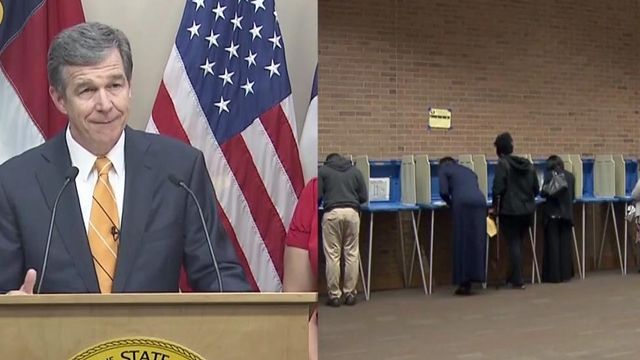Cooper plans suit to keep two amendments off November ballots
Proposals affecting the governor's appointment power are designed to trick voters, Gov. Roy Cooper's office says.
Posted — UpdatedThe two bills shift appointment powers from the Governor's Office to the legislature and, in the administration's words, would "cripple separation of powers and checks and balances."
Gov. Roy Cooper's office also accused GOP authors of trying to deceive voters with innocuous language in an effort to slip the proposed amendments past voters, who must approve them in a statewide referendum if the constitution is to change.
Cooper's promised suit, provided to reporters late Saturday afternoon and headed Monday for Wake County Superior Court, targets amendment language contained in House Bill 913 and Senate Bill 814.
The first amendment reworks the state elections board and "clarifies," according to General Assembly leaders, the legislative prerogative to control appointments currently made by the Governor's Office. Voters will be asked to vote for or against this statement without further explanation on the ballot:
Senate Bill 814 largely shifts the power to fill vacant judgeships from the governor, who can currently pick just about any attorney, to the legislature. The governor would still make judicial appointments but would have to pick from two names forwarded by the General Assembly after a commission reviews potential candidates.
For this amendment, voters will vote for or against:
There is an argument between Republicans and Democrats over whether the way this underlying bill is worded would also give the General Assembly a loophole to circumvent gubernatorial vetoes without having to muster the three-fifths vote it takes now to override. GOP leaders said Saturday past legal precedent won't allow it and that it was never their intent to open this sort of loophole.
"We're standing here telling you what our intent is," Senate President Pro Tem Phil Berger said Saturday.
Republicans have accused Democrats of tin-foil-hat conspiracy theories designed to derail this amendment with voters, and GOP leaders had predicted legal action, but they didn't immediately respond Saturday evening to the governor's announcement, which came shortly before 5 p.m.
"We trust the voters to be able to read and understand what is put before them," state Rep. David Lewis, R-Harnett, a key GOP leader in the House, said shortly before Saturday morning's override session.
Related Topics
• Credits
Copyright 2024 by Capitol Broadcasting Company. All rights reserved. This material may not be published, broadcast, rewritten or redistributed.






